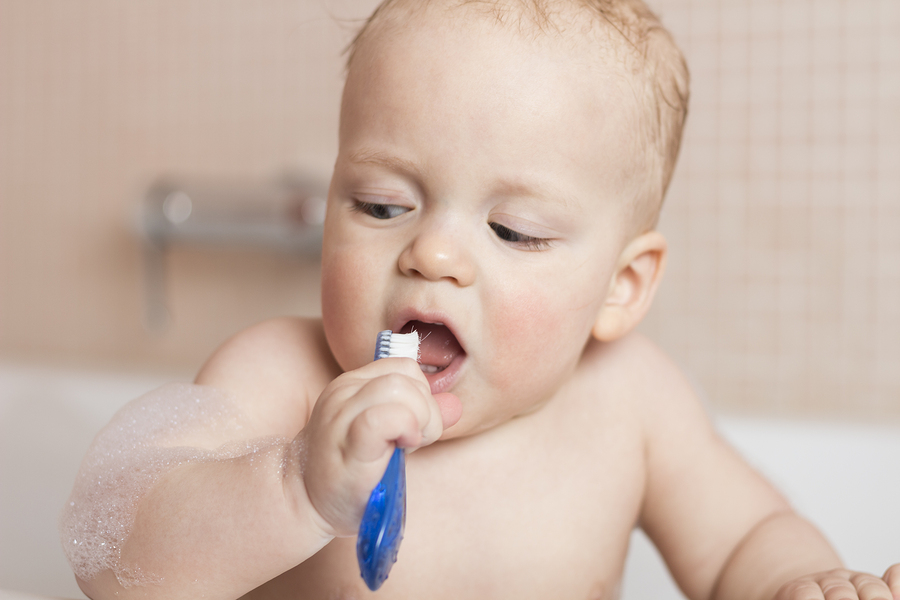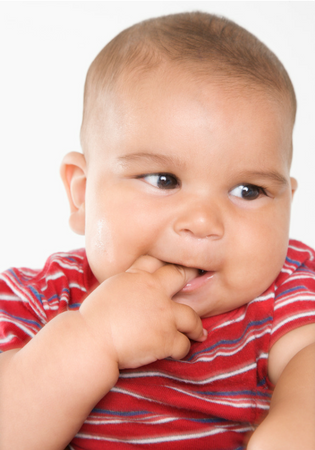By: Dr. Elizabeth Eggert
Baby teeth are more than just placeholders for your child’s adult teeth. They help young children chew and even speak clearly. Taking good care of your child’s baby teeth lays a healthy, strong foundation for their permanent teeth, too.

Gum Care Starts at Birth
You can start building healthy oral health habits as soon as your little one arrives. Wipe down your newborn or infant’s gums twice a day, preferably just after feeding. Use a soft, moistened washcloth or a bit of damp gauze.
When It’s Time for the Toothbrush
When your child’s first tooth appears, it’s time for the toothbrush. Choose one with soft bristles and a large handle. The bristles and head will be comfortable for your baby, while the large handle is easier for you to handle.
Parents often ask us if it’s okay to use toothpaste for their young children’s new teeth. We recommend just using water at first, and then introduce fluoride-free toothpaste around age 1. When your child can adequately spit into the sink, it is time to start using fluoride toothpaste, generally using the standard pea-sized amount.
Another question we get is when it’s okay to have your kids start brushing their own teeth. If your child can hold their brush themselves, they can start brushing their own teeth—with your supervision, of course! This means mom or dad should ALWAYS follow up the brushing, looking for and pointing out any areas that were missed, especially in the far back. Children really don’t have the dexterity and understanding to fully brush completely alone until age 8-10.
Why Good Oral Care Matters for Kids
Can wiping down your newborn’s gums and brushing your child’s single baby tooth really make that much of a difference? Yes. Baby teeth are susceptible to tooth decay just like permanent teeth are. Brown or white spots on baby teeth, pits in baby teeth, cavities, and other signs of decay can be painful for your child and prevent them from chewing properly.
To prevent tooth decay in young children, we suggest you stick to breast milk, formula, and water before 6 months. After your child is eating solid foods, continue to avoid sugary drinks, including soda and juice. Never put sugar or honey on your child’s pacifier.
A Quick Word on Teething
 Teething is a natural process that occurs through age 2-3, when most baby teeth have been pushed through your child’s gums. Erupting teeth can cause discomfort or even pain for your child. If your little one is drooling more than usual, has swollen gums, or a higher than normal temperature, chances are he or she is teething. Alleviate the pain with a cold washcloth or teething ring. Rubbing their gums with a clean finger can also provide relief.
Teething is a natural process that occurs through age 2-3, when most baby teeth have been pushed through your child’s gums. Erupting teeth can cause discomfort or even pain for your child. If your little one is drooling more than usual, has swollen gums, or a higher than normal temperature, chances are he or she is teething. Alleviate the pain with a cold washcloth or teething ring. Rubbing their gums with a clean finger can also provide relief.
We look forward to seeing your little one for their first dental appointment around their first birthday. We’ll help you build healthy habits and can give you tips on tooth care, teething, and thumb sucking. Schedule your child’s recare visit today.